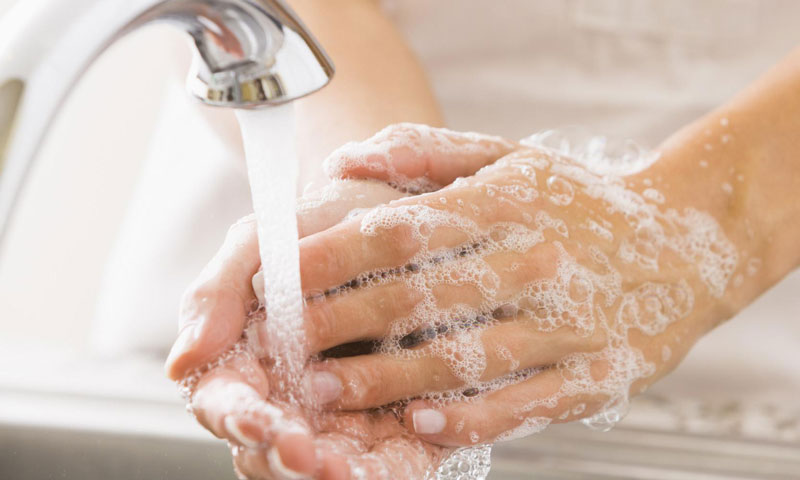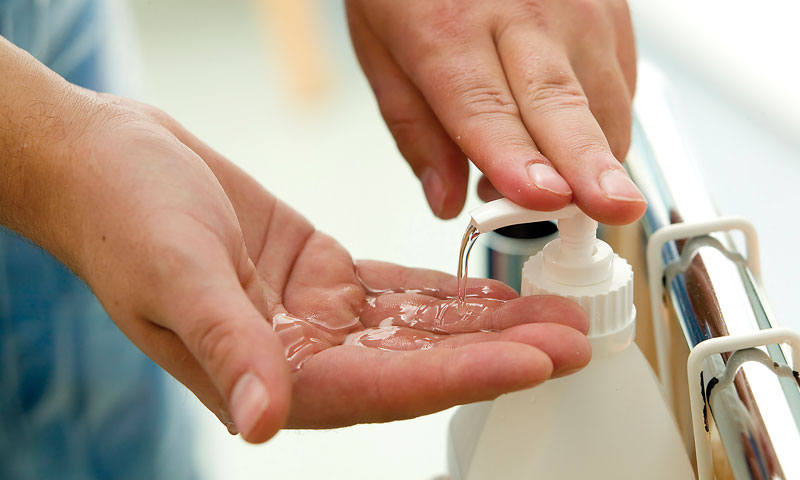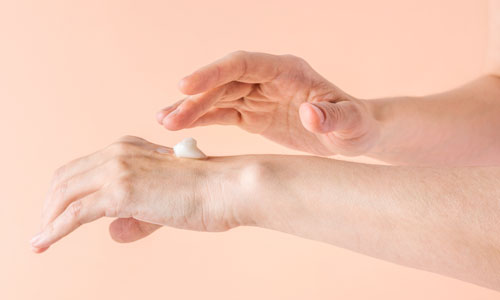Clinician Hand Care
Healthcare revolves around taking care of patients and their needs, sometimes overlooking the needs of caregivers themselves. This is especially true when it comes to skin care. Skin is the largest organ in the body and it is exposed to a multitude of harmful pathogens on a daily basis.
Working as a healthcare professional in a challenging and dynamic environment, it is important to follow appropriate hygiene and to protect and nourish skin.
1


Hand Washing
Anyone working in the healthcare profession knows that hand washing is a necessity. When a health care professional works a 12 hour shift in an intensive care setting they may perform hand hygiene procedures every 10 minutes, averaging about 200 hand hygiene exposures in 3 days.
During an average shift, most people perform this 12 to 30 times in 3 days¹. Constant hand washing is detrimental to skin health. Surfactants are a key ingredient to make soaps effective cleansers but with repeated use they are harsh and can damage the skin by "stripping the acid mantle."²
The epidermis, which is the protective outer layer of the skin, can also be damaged by frequent contact with water. Once skin is damaged micro-organisms are able to penetrate causing irritation and deter the formation of normal skin growth.
2


Disinfection
Alcohol rubs are vital to disinfection. Over 20 Studies have been done by the United State’s Center for Disease Control (CDC) showing that using alcohol based rubs is more effective at reducing bacteria on the hand than soap and water¹.
Unlike its counterpart, alcohol based rubs do not wash away natural oils of the skin; they are rubbed back in during the hand rub process. Even though there are no known allergies to ethyl or isopropyl alcohol these rubs can cause some discomfort during the application process.
When the user has open wounds or sores on their hands a mild burning or stinging sensation can be felt. Although this pain is temporary it causes a lot of users to substitute the rub with soap and water further damaging the integrity of the skin.
3


Hydration
In a healthcare setting, skin is always the primary interface. Nurses, doctors, and caretakers must subject themselves daily to thorough and somewhat harmful hand hygiene procedures.
It is important for them to do everything they can to keep their hands healthy, not only for their safety but for the safety of their patients.
Moisturizing is a key component in preventing dry cracked or scaly skin, it is recommended to use lotions or other skin repair products as often as possible.
References
¹ Medline University, eCourse "Breaking Through Hand Hygiene & Skin Care Barriers", available at www.medlineuniversity.com
² Medline University, eCourse "Skin Care for Healthcare Assistants", available at www.medlineuniversity.com
Wearing gloves is something that all healthcare professionals have in common. Gloves create an effective barrier for both the clinician and the patient. Despite this protective barrier there is still a need to perform hand hygiene procedures.
In 2009 the World Health Organization published “5 moments of hand hygiene”¹ which include, before touching a patient, before you clean or perform sterile procedures, after exposure to bodily fluid, after touching a patient, and after touching any patient’s surroundings.
Constant hand washing and hand sanitizing must be done in order to prevent the spread of infection however it can cause skin irritation. The irritation triggers skin to start a self-repair process. If the hands are continually going though this cycle of breaking down and repairing, normal skin is unable to be formed. The poor condition of the healthcare professional hands can directly and negatively affect their job in several ways.
Germ Transmission
According to the NHS professionals, the most common mode of transmission of disease is by pathogens, and 80% of those pathogens are transmitted by the hands.²
Escherichia Coli (E. Coli) can live on a surface for up to 16 months while Staphylococcus Aureus (MRSA) up to 7 months.³ These germs know no boundaries and can live anywhere including damaged skin.
Cuts, cracks or fissures are ideal places for microorganisms to plant themselves; it also makes it extremely easy to transfer from nurse to patient.
Discomfort Due to Damaged Skin
Hands that are dry, cracked, scaly or rough are especially sensitive to discomfort caused by alcohol based rubs. However alcohol based rubs are less harmful to the skin than soap and water as they help retain natural lipids and incorporate vital emollients.³
Despite benefits of using the rub many users prefer hand washing in order to avoid the stinging or burning caused by the alcohol based product.
A reaction to an alcohol based hand antiseptic is typically a sign of pre-damaged skin, it is recommended that a caregiver who does experience this resist reverting to soap and water and should use the rubs in conjunction with professional grade hand lotions.
Allergic Reactions
In some extreme cases occupational related contact dermatitis can develop from the frequent and repetitive use of hand hygiene products.
Contact dermatitis as both an irritant and allergy can surface as dry, itchy, irritated areas around the hand or other areas that have been exposed to soaps, solvents, and cleansers.4
Even though this is an acute and very manageable allergy it is crippling to a career of anyone working as a healthcare provider.
References
¹ World Health Organisation, "Five moments for hand hygiene", available at www.who.int
² NHS, Report on Standard Infection Control Precautions, , available at www.nhsprofessionals.nhs.uk
³ Medline University, eCourse "Hand Hygiene Program: Basic Principles", available at www.medlineuniversity.com
4 National Center for Biotechnology Information, "Occupational irritant and allergic contact dermatitis among healthcare workers", available at www.ncbi.nlm.nih.gov
Hands are considered the healthcare professionals’ greatest tool, or at least their most utilised, that is why keeping their skin on and around the hands healthy is so vital. It is the responsibility of everyone working in this field to aid in the education and prevention of damaged skin.
Educating Hospital Staff
Education is key in prevention. The universal need for good hand hygiene and skin health is something that is shared between both the staff and patients. Teaching or simply reminding staff when a situation calls for hand washing over the use of alcohol based rubs as well as the use of rubs over hand washing can make a dramatic difference. Education is an important tool in spotting potential problems. Teaching the staff the early signs and best practices in caring for dry or damaged hands as well as providing professional grade moisturisers is vital.
Prevention
In leisure time it is recommended to avoid skin stressing activities, such as cleaning. Repeated exposure to surfactants can wear down and damage the skin, surfactants can be found in laundry detergents, liquid body washes, and shampoos.¹
Nourishing and Moisturising the Skin
Taking care of skin is important to one’s overall health. Even though skin is composed of water it is still important to keep it hydrated, nourished and moisturised. One way to help cope with daily demands of hand hygiene is the steady use of lotions or other hand repair products. Healthcare professionals should be moisturising before and after each shift, after breaks, and as often as possible in their free time. There are two ways to moisturising the skin, adding moisture and keeping moisture from leaving. Petroleum jelly for example, acts as a lid and seals in moisture however it does not let the skin breathe, this is called skin respiration. Most hospitals discourage the use of lotions or moisturisers containing petrolatum and mineral oils. A good choice of product is one that adds moisture while slightly sealing it in. Look for skin repair products that contain ingredients like natural oils and silicones, more specifically dimethicone.¹ The use of a lotion or moisturiser is not a quick fix and should be used continually to help combat the irritation caused by excessive washing.
References
¹ Medline University, eCourse "Continuing Education for Healthcare Assistants including CNA’s, Home Health Aids and Health Care Techs", available at www.medlineuniversity.com
Related Products

